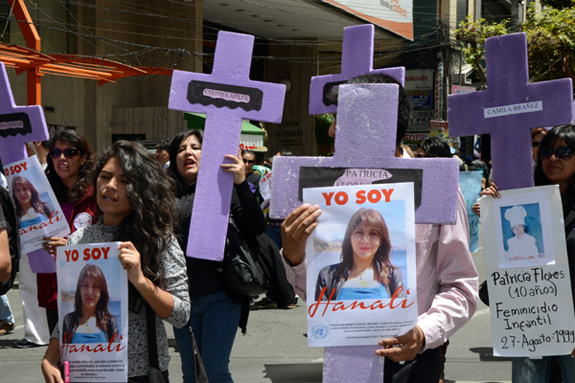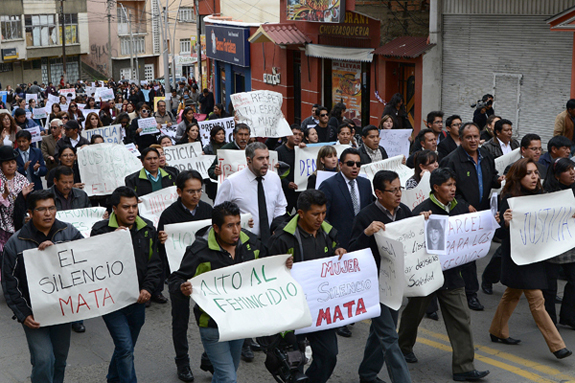Bolivia works to reduce violence against women
June 13, 2013 - infosurhoy
A new law mandates a 30-year prison term, without the possibility of parole, in cases involving the death of a woman.
By María L. Vivas for Infosurhoy.com
LA PAZ, Bolivia – Women in Bolivia can now rely on police who specialize in gender-based violence cases.
(below) Women march in protest against gender-based violence and to demand better work opportunities during International Women's Day in La Paz, Bolivia, on March 8. (Aizar Raldes/AFP)

The Task Force to Combat Gender-Based Violence (FELCV) debuted on June 9 with the goal of reducing this type of crime, which affects an average of seven out of every 10 women nationwide, according to 2012 figures from the United Nations.
A total of 621 women in Bolivia were murdered between 2009 and February 2013, according to the Center for Women's Information and Development (CIDEM). Femicides accounted for 64.9% of the killings, with the remaining 35.1% classified as public safety crimes. A femicide is committed every three days in the Andean nation.
Bolivia's police force has 900 officers trained to handle cases involving gender-based violence, according to Lt. Col. Rocío Molina of the La Paz Family Protection Brigade.
The police have locations open 24 hours a day in each of the country's nine departments to provide services to women who have been the victims of gender-based violence. There also will be mobile units to patrol the streets.
Law 348, which was passed on March 9, created this unit. The legislation was passed following the murder of journalist Hanalí Huaycho allegedly by her husband, Jorge Raúl Clavijo, a former police officer, on Feb. 11.
The law mandates a 30-year prison sentence, without the possibility of parole, for those found guilty of killing a woman. The legislation also introduced the creation of shelters for women and mandated the active participation of all of the country's departmental, municipal and autonomous indigenous governments in the fight against gender-based crimes.
"The law is eminently preventive and will allow us to make progress in doing away with inherited cultural patterns," said Inés Pérez, director of gender affairs at the Vice Ministry for Equal Opportunities.
(below) La Paz residents protest the killing of reporter Hanalí Huaycho on Feb. 11, 2013. The primary suspect is her husband, Jorge Raúl Clavijo. (Aizar Raldes/AFP)

Another initiative introduced by the law is the creation of special courts to deal specifically with cases involving gender-based violence. The judges and court officials received training to deal with the crime.
"For many years we've been fighting to establish new parameters that would allow us to understand that violence towards women is a societal problem and that state actions and public policies were needed to drive these major changes," said Raquel Romero, the director of the NGO Fundación Colectivo Cabildeo. "Above all, the most important thing is to change the mentality and the social practices, at home, at school and at work, between men and women."
Bolivian President Evo Morales has urged numerous government ministries to allocate immediate funding to carry out the measures included in the law, which hasn't received a budget.
"The law states that [eliminating] violence is a national priority, so it requires the efforts of all public institutions," said Mónica Novillo, the head of advocacy at Coordinadora de la Mujer, a network made up of 26 NGOs. "The Ministry of Communications is expected to spread the information contained in the law. The Ministry of Education is to incorporate the law in school curricula, while the Ministry of Health develops the protocols for the provision of care of victims."
Novillo said school curriculums nationwide are being modified.
"The Ministry of Education is working on the curricula for the first year of grade school and the first year of high school, which will include the issues of sexual and reproductive rights and violence," she added.
Romero said education will spark change.
"The violence is structural in nature, and that's why we not only have to focus on the effects but also have to attack the causes," Romero added.